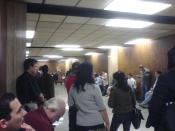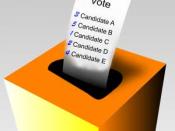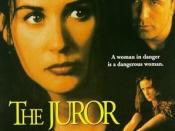Part 1
How would you describe the group task?
The group task is to reach an unanimous decision. They have to 'do their duty', they have to reach a consenus decision, so they are forced to have a dialogue with an extreme diverse set of people.
Why conflict arises?
When they perform a preliminary vote, they find out that one juror think the accused is not guilty 'beyond reasonable doubts'. The other 11 jurors are surprised and then quite angry that HF does not see the 'obvious' guilt in the case. Conflict arise because of a different understanding of the reality, of different personal situations (and prejudices) and backgrounds. The environment, the very hot jury room and that the men become more and more weary enlarges all this too.
What does HF/JL do to win influence?
He instills doubt. He argues that it is wrong, even illegal, to send someone to death when there's reasonable doubt.
First HF convinces another juror that the evidence is not proven. HF shows that every vote is worth as much as the other ones, even if he is in minority and feel pressured.
What does HF/JL do not do to win influence?
HF maintained his composure, maintained diplomatic and tactful. Even as the loner who disagreed with everyone, he never once let the others pressure him into thinking differently. Despite that, he also never fought back with anger, never raised his voice, said the accused was innocent, claimed the other jurors were wrong. He never gave the others a reason to hate him with a personal vengeance.
Part 2
Does HF/JL maintain the same strategy as in part 1?
Rather than sitting back and allowing the others to prove why he is wrong, he speaks up in part 2.


